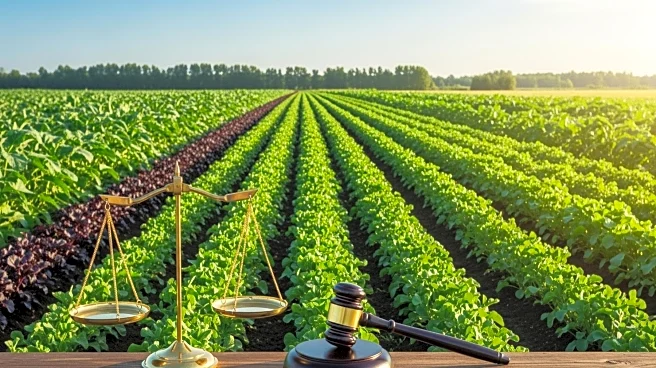What is the story about?
What's Happening?
Thomas Gent, a fourth-generation farmer in the UK, has been navigating the complexities of transitioning to regenerative agriculture. His family farm began this transition nearly two decades ago, driven by economic necessity and the influence of no-till farming practices observed in Argentina. Despite initial challenges with machinery and lack of information, the farm has successfully adopted regenerative practices. Today, Gent is involved with Agreena, a carbon insetting company, and has established the Gentle Farming brand to market their regenerative produce. However, the transition remains fraught with challenges, particularly due to policy uncertainties and climate impacts. The UK government's shift from EU subsidies to an outcomes-based funding approach has left farmers in a precarious position, exacerbated by extreme weather conditions affecting crop yields.
Why It's Important?
The transition to regenerative agriculture is crucial for sustainable farming and environmental resilience. However, the financial and policy uncertainties faced by farmers like Gent highlight the broader challenges within the agricultural sector. The shift away from stable EU subsidies to a more unpredictable funding model places additional financial strain on farmers, potentially hindering the adoption of regenerative practices. This situation underscores the need for diversified income streams, such as carbon markets, to support farmers during the transition. The success of regenerative agriculture could lead to significant environmental benefits, including improved soil health and carbon sequestration, but requires stable financial and policy support to be viable on a larger scale.
What's Next?
Farmers will need to explore alternative income sources to mitigate the risks associated with policy changes and climate variability. The development of carbon markets and private funding initiatives could provide necessary financial support. Additionally, the UK government may need to reassess its agricultural policies to ensure they align with the needs of farmers transitioning to regenerative practices. The ongoing dialogue between farmers, policymakers, and industry stakeholders will be critical in shaping a sustainable future for agriculture.
Beyond the Headlines
The transition to regenerative agriculture also raises ethical and cultural questions about the future of farming. As traditional practices evolve, there is a need to balance innovation with the preservation of farming heritage. The role of technology and market forces in shaping agricultural practices will continue to be a point of discussion, as will the impact of these changes on rural communities and food security.
















